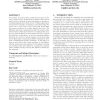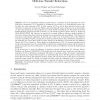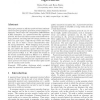80 search results - page 11 / 16 » Zero-knowledge from secure multiparty computation |
122
click to vote
WPES
2004
ACM
15 years 8 months ago
2004
ACM
The number of location-aware mobile devices has been rising for several years. As this trend continues, these devices may be able to use their location information to provide inte...
145
click to vote
CRYPTO
2010
Springer
15 years 4 months ago
2010
Springer
Due to its universality oblivious transfer (OT) is a primitive of great importance in secure multi-party computation. OT is impossible to implement from scratch in an unconditional...
131
click to vote
SSS
2007
Springer
15 years 9 months ago
2007
Springer
We present a modular redesign of TrustedPals, a smartcard-based security framework for solving secure multiparty computation (SMC)[?]. TrustedPals allows to reduce SMC to the probl...
124
click to vote
SDM
2008
SIAM
15 years 4 months ago
2008
SIAM
Currently, many privacy-preserving data mining (PPDM) algorithms assume the semi-honest model and/or malicious model of multi-party interaction. However, both models are far from ...
114
Voted
IJNSEC
2006
15 years 2 months ago
2006
This paper presents an efficient password-based authenticated encrypted group key agreement protocol immune to dictionary attack under the computation Diffie-Hellman (CDH) assumpt...




